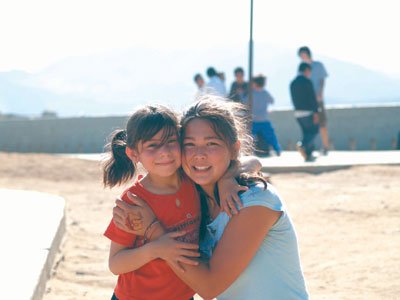Mixing cement in the hot sun on the ground
”
Mexican style
”
is arduous work. Powered by a breakfast of beans, rice and
tortillas we set out to help rebuild the foundation of a mission
church in a desperately poor colonia on the outskirts of Tijuana,
Mexico last week. The previous foundation had sunk into the sewage
saturated soil. We were a team of day workers housed in bunks on
the Rancho de Sus Ni
ños. Gathered at the rancho cinder block wall our first morning,
we boarded an old, dusty school bus for the ride out to the
colonia. My linguistic skills in German and French failed to help
me communicate and I trusted our guides to take me to the work
place. My co-workers were high-school student
s from the ECHO youth group in Morgan Hill. The experienced
workers had gloves, a hat, a water bottle, and were prepared for
the sights of extreme poverty. I had a hat and a water bottle.
Mixing cement in the hot sun on the ground “Mexican style” is arduous work. Powered by a breakfast of beans, rice and tortillas we set out to help rebuild the foundation of a mission church in a desperately poor colonia on the outskirts of Tijuana, Mexico last week. The previous foundation had sunk into the sewage saturated soil. We were a team of day workers housed in bunks on the Rancho de Sus Niños. Gathered at the rancho cinder block wall our first morning, we boarded an old, dusty school bus for the ride out to the colonia. My linguistic skills in German and French failed to help me communicate and I trusted our guides to take me to the work place. My co-workers were high-school students from the ECHO youth group in Morgan Hill. The experienced workers had gloves, a hat, a water bottle, and were prepared for the sights of extreme poverty. I had a hat and a water bottle.
After a rough ride through undeveloped dirt roads we arrived at the job site. Neighbors of the mission church smiled and waved through broken-down gates that guarded their houses along with medium-sized mutts barking. We faced two large piles of sand and rock, shovels and wheelbarrows. I tried to get a handle on what was required of us but the instructions were in Spanish and again my choice of languages did not help. A local girl joined us, helping to move the piles of rock and sand into a recipe volcano mixed with questionable water. Our new native friend worked and smiled and through a mixture of sign language and some help through another worker’s limited knowledge of Spanish we learned the girl was actually a 15-year-old mother with two babies at home. Home, we learned was a neighboring colonia, and after our morning work was completed the young mother eagerly took the bag of chips and soda we offered to her. On our way out of the colonia I saw some young mothers walking with their children. None of the poor in Mexico wear the rags of “Les Miserables.” We send too much of our clothing donations south to have that happen but sometimes the irony of the printed phrases on the shirts hit an odd funnybone. Out of the dust of the colonia one of the walking mothers wore a black T-shirt with white print saying, “No, I will not fix your computer.”
Our day ended back at the Rancho with playtime in the orphanage and more beans and rice for dinner.
Each day became progressively hotter and on the third day we mixed more cement on the Rancho for the wall around the new daycare center. The fourth day was the warmest and we were given pick axes and shovels to continue the work on the foundation trench for the center. The chain gangs in the movies make it look so easy. It’s not. The ground was bone dry and made of clay mixed with solid rock. And it wasn’t my day to have the allocated warm bucket of water for a sponge bath. I went to bed with pebbles in my sleeping bag that simulated the feel of ants crawling up my legs. It was the first time I thought I might have bed bugs.
Working in the soil of Mexico for a week’s time has caused me to look at our own day workers outside of the local hardware stores in a different light. Although my own experience as a day worker was paid for by the youth group and our day was a three-hour stint, not eight, I can appreciate the language barrier problem and the back-breaking work of digging and mixing. Each morning in Mexico I questioned my commitment to working, but then I looked in the dark brown eyes of the Mexican orphans and saw their joy in having food and a house mother to love them. The trench work suddenly didn’t seem so difficult.
When our week of work ended we headed back north toward the border when I realized I lost my birth certificate which I had been told I needed to re-enter California. As we headed down toward the check point, nervous I’d be kept at the border, I began to scan the metal wall built to keep the poverty on one side of the hill. A short, homemade ladder was leaning up against the wall ready for use in the night. I feared I might need to use it. Life is hard on that side of the wall and I wasn’t sure I was ready for it. Luckily the border guard accepted my driver’s license and we were on our way to comfort, a warm shower and work at a computer. I’m planning the same trip next year to help continue the work on the daycare center and to visit my wonderful new Mexican friends at the Rancho de Sus Niños.
Adios amigos.












